When it comes to choosing a web hosting provider for resource-demanding projects, A2 and SiteGround are parts of the top choices. These web hosts use the best performance technologies to create the perfect hosting environments for traffic-heavy sites and big projects. However, since we cannot use both hosts, there is a need to choose either SiteGround or A2 Hosting for your project.
In order to make this decision easier for you, we have done an in-depth SiteGround vs A2 Hosting comparison in 2025. This article, will, therefore, guide you in choosing the better host between them for your business.
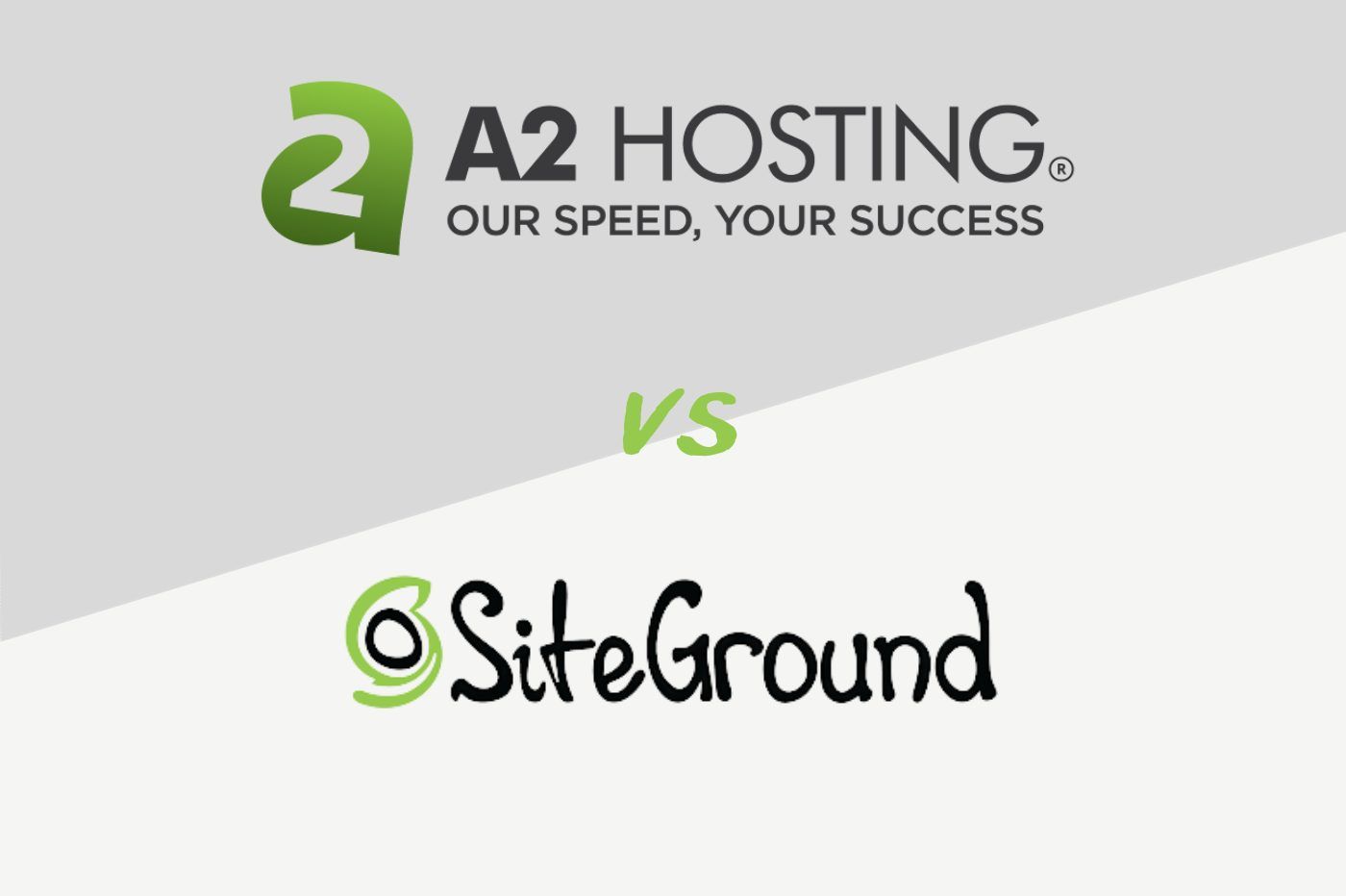
SiteGround vs A2 Hosting: General Info
SiteGround is one of the best WordPress hosting providers in 2025. The host comes highly recommended by WordPress.org and it delivers without failure. SiteGround is an all-around web host that excels in all important areas.
It is highly secure, easy to use, very scalable, multi-purpose, optimized, and extremely loaded with essential & advanced features. We recommend it for hosting big websites like online stores that get a lot of traffic.
A2 is also a reliable web hosting provider with a lot of features and a focus on big projects. The main selling point of A2 Hosting is its performance prowess.
Most of the A2 Hosting’s plans are equipped with extremely powerful servers with multi-core processors and high-end RAM. A2 is an excellent option for hosting media-heavy websites. One disadvantage of A2 is that its pricing is a bit above average.
A2 vs SiteGround: Which Has More Hosting Types & Plans?
Most of the time, the right host for a website or project is determined by its needs. There are many hosting types and they are used based on the present or projected needs of a website. Generally, there are shared, managed WordPress, VPS, cloud, and dedicated server hosting types.
Shared hosting is used for small websites that do not need a lot of resources. In contrast, dedicated server hosting is used for websites that require a lot of resources to function well.
In our opinion, even if the necessary hosting type a website needs currently is available, there is a need to ensure others are too in order to allow for easy scaling. Now, let us see whether A2 or SiteGround has more hosting types.
A2 has shared, managed WP, VPS, reseller, and dedicated server hosting types. These hosting types have at least 4 packages that you can choose from. As a result, you will be able to upscale within and outside the same hosting type very well.
Conversely, SiteGround presents shared, managed WordPress, cloud, and reseller hosting types. Each hosting type at SiteGround has at least 3 packages. So, there is room for upscaling within the hosting types even though it is not as much as A2’s offer.
By comparison, A2 has more hosting types and plans than SiteGround. However, while SiteGound has a very scalable cloud hosting type, A2 does not have it at all. In our opinion, A2 is a more reliable web host if you have a website that will require upgrading to another hosting type as the business grows. Yet, because of how scalable SiteGround’s cloud hosting is, it is a great option if you just need a lot of resources or scalability and not a particular hosting type.
Hence, we have to consider the result of SiteGround vs A2 Hosting comparison in this aspect, a tie.
Which is More Affordable, SiteGround or A2 Hosting?
Choosing an affordable web hosting provider for a new or existing website without sacrificing quality is paramount to any online business.
By hosting a website with an affordable provider, outrageous site running costs would be eliminated. As a result, you will be able to use the funds for more meaningful projects or activities. But is A2 or SiteGround more affordable? Let us find out.
SiteGround’s pricing starts from around $3 per month and renews for $18 monthly for the StartUp plan. This plan comes with a 10 GB SSD of storage space, unlimited bandwidth, a WP website builder, and automated daily backups. It also includes free SSL, free CDN, unlimited email hosting with an automated email migrator, the ability to add collaborators, industry-grade security features, and in-house caching. It can host only one website.
In contrast, A2’s cheapest plan costs about $3 per month initially and renews at $12 monthly. The plan includes 100 GB SSD, free unlimited email hosting, unmetered bandwidth, a free SSL certificate, a WP site builder, commercial-grade security, and a staging tool. You can host only one site on this server.
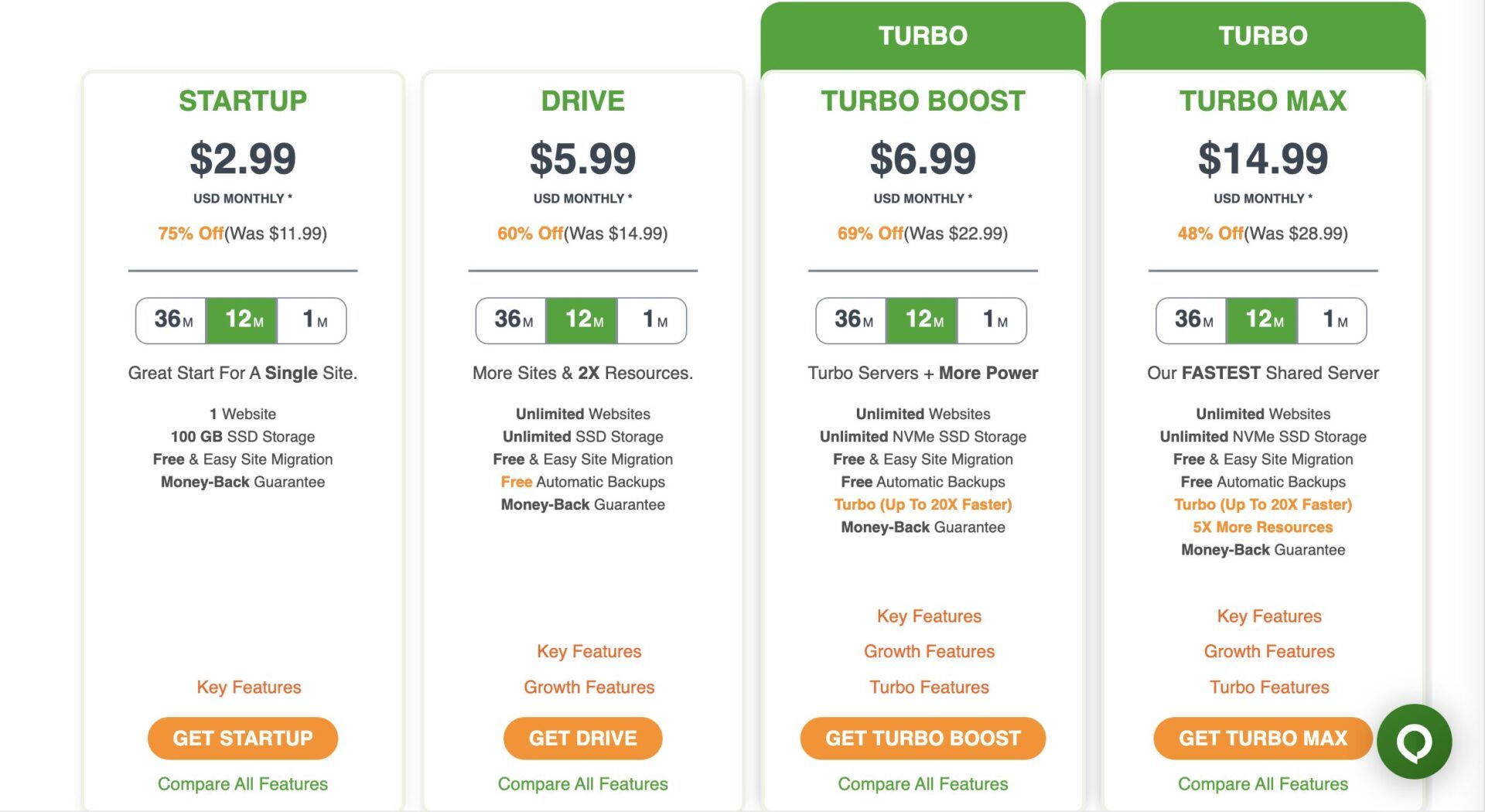
SiteGround and A2 are also registrars for many top-level domains (TLDs). A .com domain name costs around $20 yearly on SiteGround but the initial price is $18. However, on A2 Hosting, a .com domain name costs only $11 per year. Almost the same pricing pattern applies to other domain extensions, making A2 Hosting more affordable.
Both web hosts do not have free domain privacy protection that hides your information from the WHOIS database. Yet, while privacy protection costs only $10 yearly on A2 Hosting, SiteGround charges $12 for the first year and $24 yearly afterward. Whereas privacy protection is free on Hostinger.
From the information above, it is evident that the more affordable option in our A2 Hosting vs SiteGround duel is the former.
SiteGround Pricing
Here are some of SiteGround’s plans and their pricing;
- GrowBig: costs almost $5 per month; renews at almost $30 monthly. It comes with 20 GB SSD of storage space, a staging tool, on-demand backups, 30% faster PHP, and the StartUp plan’s features. This server can host unlimited sites.
- GoGeek: costs about $8 monthly; renews at almost $45 per month. In addition to GrowBig features, it comes with a 40 GB SSD, Git integration, private DNS, priority support, and white-label clients.
A2 Hosting Pricing
Here are the other shared hosting plans at A2 Hosting and the pricing;
- Drive: costs around $6 per month; renews at $15 monthly. It includes Startup features, unlimited SSD, automated daily backups, unlimited databases, and 2X resources. It can also host unlimited websites.
- Turbo Boost: costs about $7 monthly; renews at $23 per month. It comes with LiteSpeed servers for 20X performance, unlimited NVMe SSD, Turbo cache, and Drive features.
- Turbo Max: costs almost $15 per month; renews at about $29 monthly. It includes 5X resources and Turbo Boost features.
Which Host Has More and Better Features, SiteGround or A2 Hosting?
Another factor we considered during our SiteGround vs A2 Hosting comparison was the availability of features. Because of the specific needs of websites, it is important that hosts provide the features that will satisfy them. Otherwise, customers will have to get third-party tools that will fulfill those needs.
Furthermore, there are some features that one cannot integrate using third-party services. Thus, it is advisable to choose a web host that has them built-in in order to prevent issues that could arise from the unavailability. An example of features that cannot be added via third-party tools are NVMe SSD, in-house caching, OS type, bandwidth limit, etc.
In our opinion, preference should be given to the web host that has these features built-in and included in its plans.
SiteGround Features
SiteGround is a feature-rich web host based on our findings. The hosting provider has all the essential features in the important areas built-in and they are available free of charge, depending on your plan. Aside from the essential features, it has some special tools and technologies to improve ease of use, security, and performance.
Here are some of the features the web host offers;
- Free email hosting with a migrator tool
- Unlimited databases, bandwidth, and FTP accounts
- 10 GB to 1 TB SSD storage space allocation
- Automated daily and on-demand backups
- Free SSL certificates
- Multiple data centers and Free CDNs
- Ability to add collaborators
- Website staging and Git integration
- White-label clients feature
- 24/7 customer support via live chats, phone calls, and tickets
Other features it provides include a custom control panel (Site Tools), commercial-grade security, custom performance technologies, a free WP site migrator plugin, a one-click app installer, a free WordPress site builder, and WooCommerce-ready servers.
A2 Hosting Features
A2 is also well-packed with many essential features. In fact, aside from the fact that SiteGround has more proprietary tools, both hosts provide features with similar or the same purposes. Hence, in our A2 Hosting vs SiteGround analysis, we have to choose the latter as the preferred option.
Here are some of the features available at A2 Hosting;
- Free email hosting
- 100 GB to unlimited NVMe SSD storage space
- 1 free cPanel migration irrespective of the number of sites
- LiteSpeed web servers with server-level caching
- Automated backups & website staging tool
- Free site builder to create a WordPress site in minutes
- Multiple data centers
- One-click app installer
- 24/7 customer support
- Advanced performance and security features
SiteGround vs A2 Hosting: Which Host Performs Better?
Another aspect we had our SiteGround vs A2 Hosting comparison at was performance. Performance comes in different forms as far as hosting is concerned. It could be website loading speed, uptime, SEO, user experience, response time during traffic surges, etc.
Based on our expertise, the main determinants of the performance of a website are the features the web host provides. However, since a web host cannot be great at everything, there is a need to choose the one that excels in the needed areas. So, let us have an A2 Hosting vs SiteGround juxtaposition to determine which host is better in some areas. With this, you will be able to choose the better (between them) host for your specific project.
Web Server Software
This refers to the application that is installed on a server. The software used for a server determines its features and other relevant hosting properties. In a way, it has an effect on the performance of the server or website too.
SiteGround uses Nginx on all its servers. Nginx web servers are known for hosting medium-traffic websites. The web server uses moderate resources to power projects and causes less overheating. One of the main advantages of the Nginx web server software is that it works well with some caching technologies for better performance.
A2 Hosting, on the other hand, uses two web server software. The provider uses both Apache and LiteSpeed web servers. Apache is one of the most outdated web servers for websites. This is because the server software is old and it was designed for powering small projects. Apache web servers consume a lot of resources to handle small tasks, leading to overheating and downtimes. Conversely, LiteSpeed web servers are great for resource-demanding projects that are expected to deliver outstanding performance. Unlike Apache and Nginx, LiteSpeed uses fewer resources to handle very large projects without a noticeable decline in performance.
However, while SiteGround uses Nginx on all its servers, A2 Hosting uses Apache on most of its servers. As a result, you will get better performance on SiteGround plans than on most A2 Hosting packages. However, A2 Hosting packages that use LiteSpeed web servers are more promising in certain aspects.
In our opinion, the result of this A2 Hosting vs SiteGround comparison is a tie.
SiteGround vs A2 Hosting Speed Tests Comparison
The first performance experiments we carried out in the SiteGround vs A2 Hosting comparison were speed tests. Website loading speed is an important part of every business.
In fact, it is the most crucial part of a website as its effect is very noticeable to almost everybody. Many factors including how optimized the hosting environment provided by a host is, determine the loading speed of a website.
With good loading speeds, traffic and engagement will increase since visitors will be able to view more pages easily within a short period. It will boost user experience and SEO performance too. On the other hand, a slow-loading website will lead to a decrease in traffic, a high bounce rate, and a decline in SEO performance.
Before we go deep into the results of our A2 Hosting vs SiteGround speed analysis, let us see some of the metrics used in the tests.
- Time to First Byte (TTFB): measures the time taken by your server to send the first responses to the queries of a browser. Your site’s TTFB should be 0.8 s or less.
- First Contentful Paint (FCP): calculates the time it takes the first visible item on your web page to fully display on a user’s screen. An ideal FCP should be 1.8 s or less.
- Largest Contentful Paint (LCP): it indicates how long it takes the largest visible item on your web page to fully display on a user’s screen. Ideally, your site’s LCP should be less than 2.5 s.
- Cumulative Layout Shift (CLS): This indicates how stable the elements on your web pages are. While it depends on the theme in use, how the server interprets and executes the codes is influential as well. It determines the perceived user experience. An ideal CLS is 0.01 or less.
- Loading time: The loading time or speed of a web page is how long it takes all the items to fully display on a user’s screen. A good loading time should be 3 seconds or less.
SiteGround Speed Test
We analyzed our SiteGround test website using GTmetrix. In this test, we recorded how the website performed against the Core Web Vitals standard as shown above. For this experiment, we got the GrowBig plan and installed the Neve theme with its demo content on a WP site.
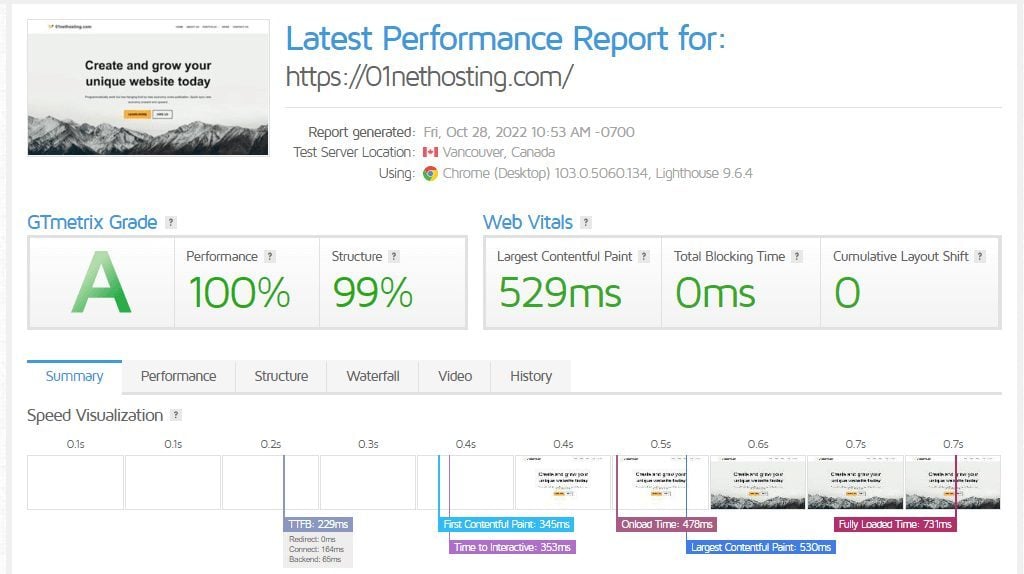
Here is the summary of the SiteGround speed test results:
- TTFB: 229 ms
- FCP: 345 ms
- LCP: 529 ms
- CLS: 0.00
- Loading time: 731 ms
From the results above, we can see that SiteGround passed the tests in all areas with flying colors. Thus, it is evident that the host is great for hosting a fast site.
A2 Hosting Speed Test
We experimented with the A2 Hosting server just like we did with SiteGround under similar conditions. For this test, we bought the Turbo Boost plan that has the LiteSpeed web servers.
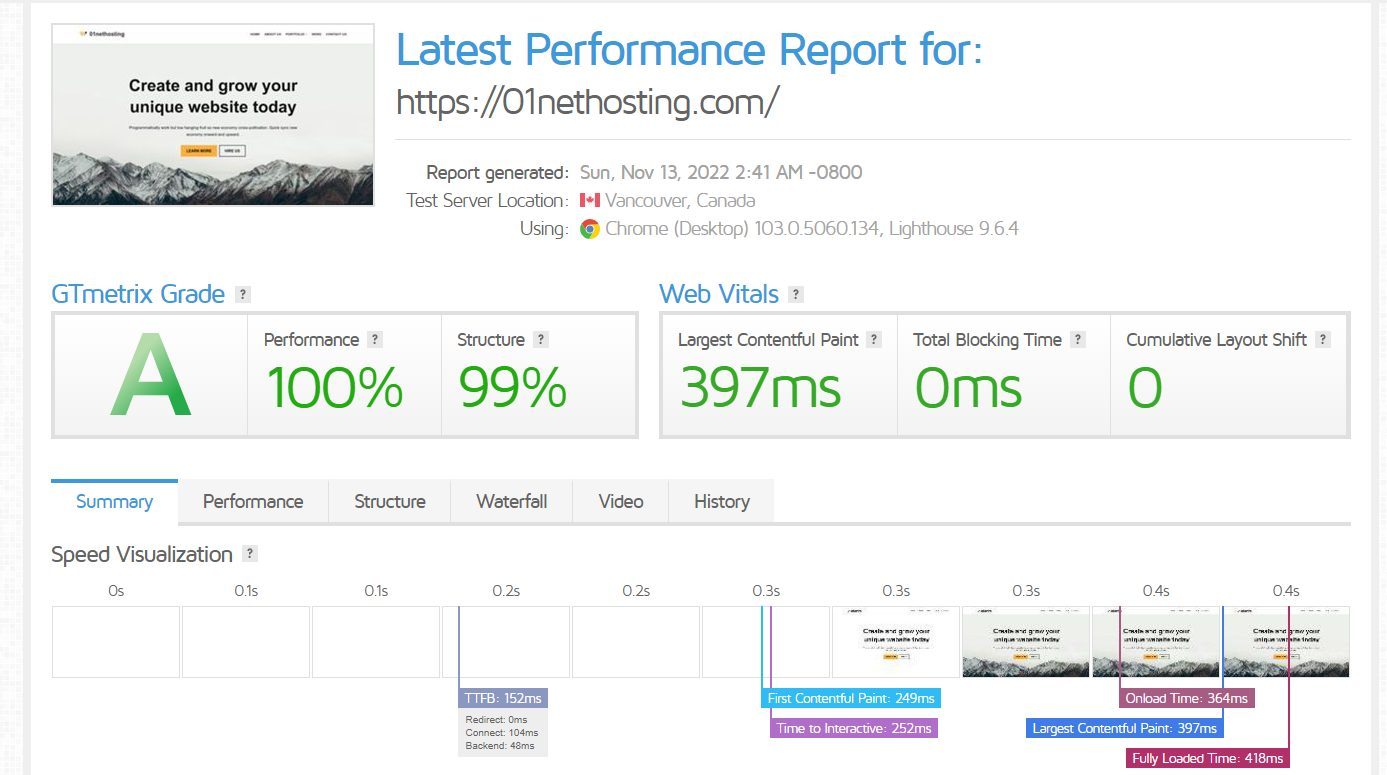
Here is the summary of the A2 Hosting speed test results:
- TTFB: 152 ms
- FCP: 249 ms
- LCP: 397 ms
- CLS: 0.00
- Loading time: 418 ms
From the results above, we can see that A2 Hosting also excels in the speed category. In fact, A2 is faster than SiteGround in all aspects. Hence, the winner of the A2 Hosting vs SiteGround comparison in terms of speed is the former.
Power Your Website with A2 Hosting
Load and Response Time Tests
Another important test we carried out for the SiteGround vs A2 Hosting duel was regarding load and response. This test aims to determine how much traffic you can expect your website to handle on each of the web hosts without a decline in performance. Thus, you will be able to choose a web host that matches your website needs.
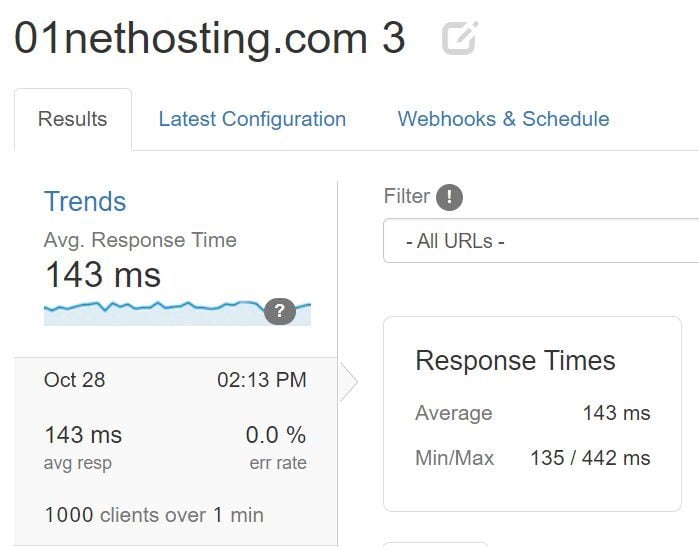
For the tests, we sent 1,000 visitors to the websites we hosted with both providers within one minute. For our A2 Hosting website, we recorded 195 ms, 257 ms, and 587 ms, as the fastest, average, and slowest response times, respectively. In contrast, we recorded the fastest, average, and allowest response times to be 135 ms, 143 ms, and 442 ms, respectively for SiteGround.
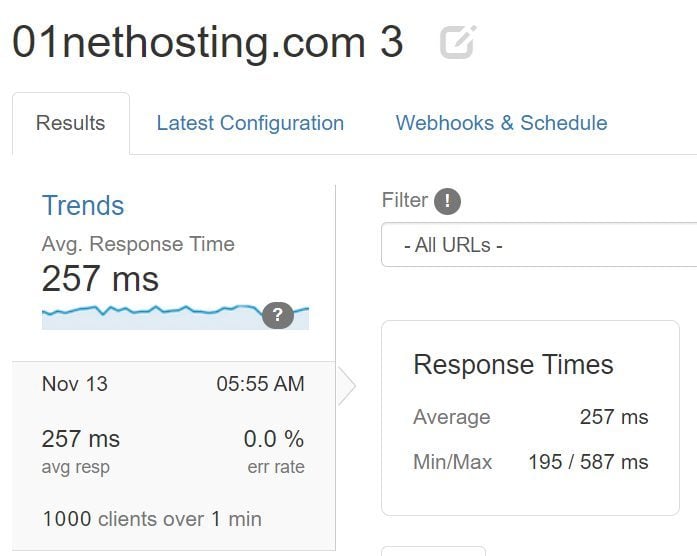
From the results above, we can see that the SiteGround test website was able to handle 1,000 visitors better and faster than A2 Hosting. Hence, SiteGround is a better choice for hosting a high-traffic website.
Uptime Tests
Uptime was another test we did during our A2 Hosting vs SiteGround comparison.
This refers to the average amount of time your website is able to stay online without experiencing downtime within a period. A good uptime means that even when your website is not online, visitors do not notice it as it does not disrupt any operations. This makes your website very reliable.
In contrast, a website with bad uptime experiences frequent or long downtimes that visitors may notice when it is offline as it may be completely inaccessible. Bad uptime leads to loss of traffic, customer loyalty, revenue, and SEO performance.
For our SiteGround vs A2 Hosting uptime battle, we used the data collected by Pingdom for the past few months and selected the same period for both. SiteGround had a 99.998% uptime, while A2 Hosting had 99.993%. Thus, SiteGround has a better uptime than A2 Hosting.
Data Centers and Their Locations
One of the main determinants of the performance of a website is the distance between the location of its data center and the main audience. Since visitors’ browsers request website files from the data center when they visit, network latency plays a role in the loading speed. Network latency defines the delay in the transmission of data over a network. So, the closer the visitor is to the data center, the faster the website. Therefore, data center location is very important as it also boosts your SEO performance.
From our findings, SiteGround and A2 Hosting have multiple data centers worldwide. A2, for instance, has 4 data centers which are in Europe, Asia, and the United States of America. The web host allows you to choose your data center during sign-up. You will also be able to change it for a $25 fee later.
On the other hand, SiteGround has 11 data centers in Asia, Australia, the United States, and Europe. SiteGround allows you to choose your preferred data center as well and you can switch later for a $30 fee. In addition to the data centers, it has CDNs on 6 continents so that no matter where your visitors are, they are served from the closest location. This will decrease the pressure on your server resources as well.
Therefore, in the A2 Hosting vs SiteGround comparison in this aspect, we crown the latter the winner.
SiteGround vs A2 Hosting: Control Panel & User Experience
Another aspect we had our A2 Hosting vs SiteGround comparison at was user experience or ease of use. Ease of use or user experience refers to how easy and enjoyable it is to manage your website via a host’s control panel. This includes website creation, maintenance, and overall navigation of the account, server, or site settings.
As we discovered in our review of A2 Hosting, the provider has an intuitive control panel.
The web host has a dashboard arranged in such a way that you will be able to access important parts of your account easily. However, in order to manage your website, you need to use the cPanel.
Drawing from our experience, A2 Hosting’s cPanel integration is quite intuitive. The A2 Hosting account dashboard links directly to a modified cPanel which presents only some of the most important settings. The cPanel lets you manage your files, databases, domains, emails, etc. It has a one-click app installer for several web apps too.
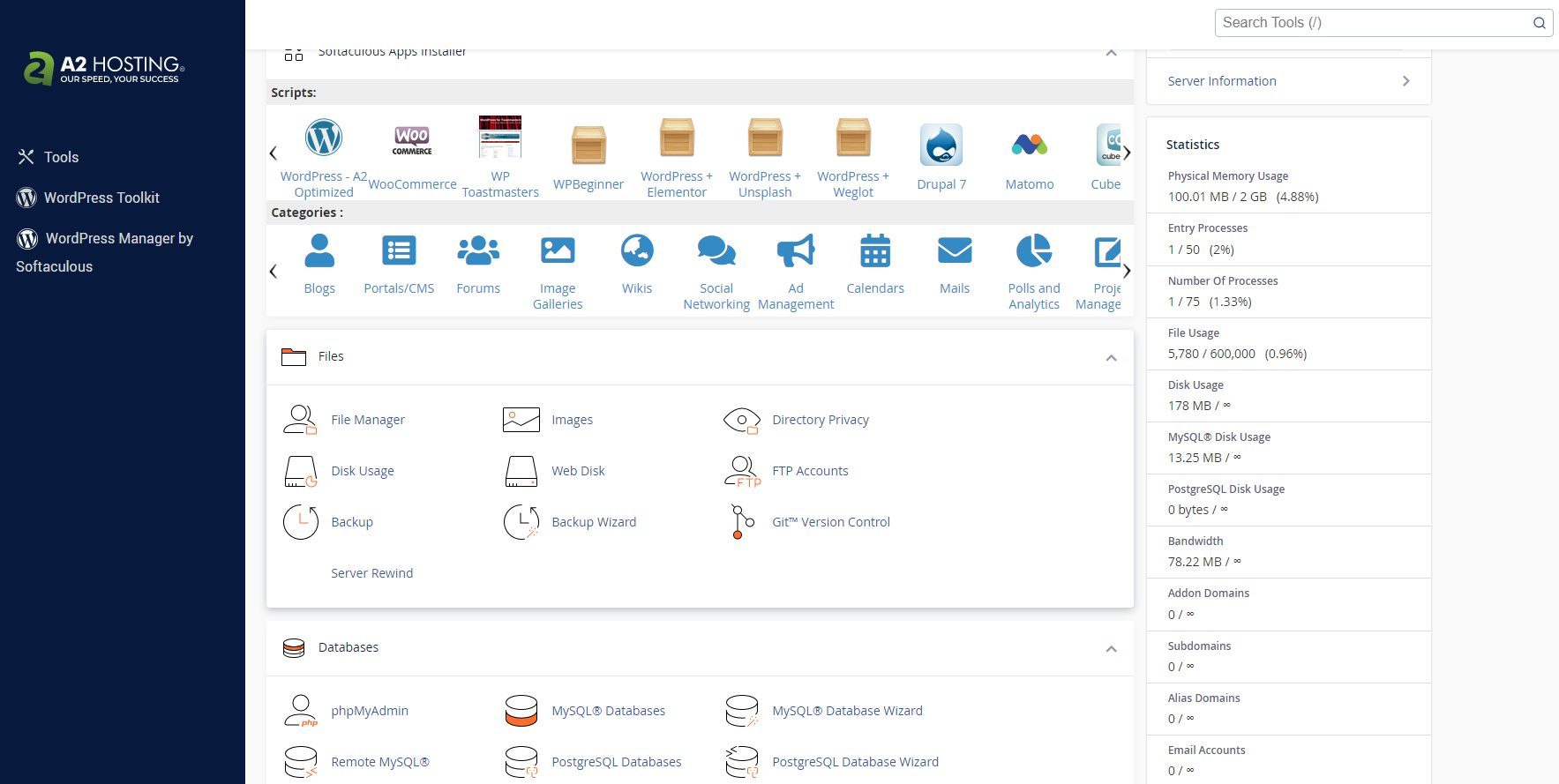
In contrast, SiteGround has a proprietary control panel called Site Tools. Site Tools is a more intuitive control panel that presents all the settings for your site and account in an easier manner.
The Site Tools has a feature that allows you to pin the important or frequently accessed settings on your website to the homepage. This way, you will be able to access them faster and improve your workflow. Aside from the fact that the Site Tools has a one-click app installer, there are other features it has that are absent on the cPanel.
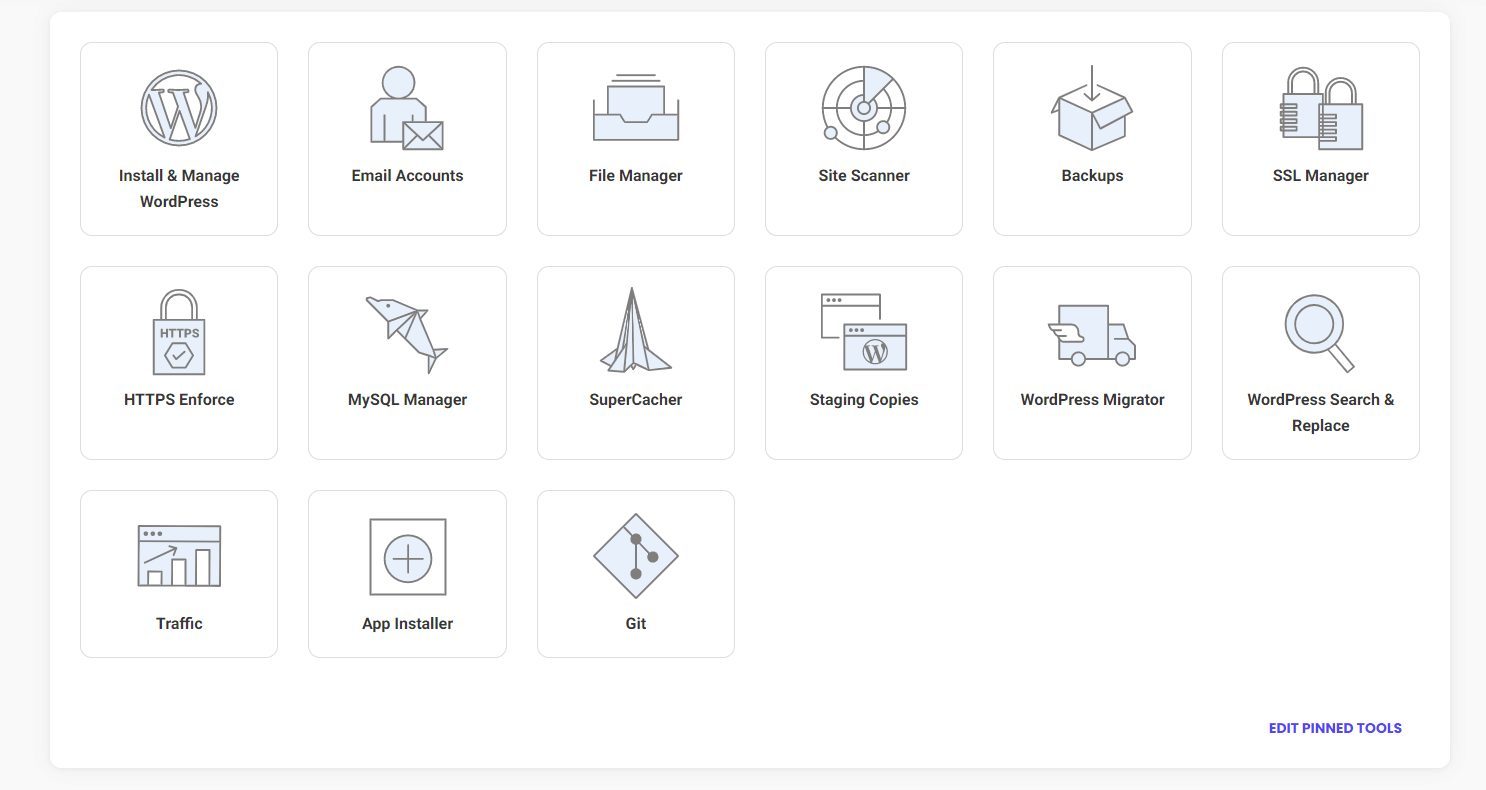
From our firsthand experience using both web hosts, we found the Site Tools to be a much better control panel. It has a more appealing interface with extra & better features.
Which is More Secure, A2 Hosting or SiteGround?
Irrespective of the type of website you are building, there is a need to ensure that it is very secure. By having a secure website, you will be able to protect your sensitive materials from cyber-attacks and possible errors. This will help you gain the trust of visitors and prevent the loss or waste of all the resources an attack could lead to.
From our findings, both web hosts are very secure with commercial-grade security measures. They have almost the same features that serve similar purposes. Nonetheless, SiteGround has some proprietary security measures that make your website even more secure. Some of the security features they have in common include 24/7 server monitoring, automated backups, SSL certificates, malware or virus scanning, firewalls, and anti-DDoS protection.
That said, SiteGround has some further security measures like the WP all-one security plugin, geo-distributed backups, and an AI anti-bot system.
From this discovery, it is safe to say that the winner of the A2 Hosting vs SiteGround comparison in terms of security is the latter.
SiteGround vs A2 Hosting: Customer Support
The last A2 Hosting vs SiteGround duel we had was regarding customer support. Customer support is very important for every website.
This is because having technical issues no matter how tech-savvy one is is inevitable. As a result, one must ensure that the customer support team of their preferred web host is available, accessible, and competent.
From our findings, SiteGround has an amazing multilingual customer support team. The team is available 24/7 via live chat, phone support, and tickets. Drawing from our experience contacting the SiteGround customer support team, the agents are quite competent, helpful, and very swift in replies. There are hardly any technical issues they cannot resolve. Aside from human support, SiteGround provides a Knowledge Base where you can find helpful articles on some frequent issues people have encountered.
A2 Hosting also has an impressive customer support team that provides help 24/7 via live chat, ticketing, and phone calls. However, unlike SiteGround which connects customers with an agent almost immediately, A2 Hosting has a waiting time that can be quite long and depressing. Yet, the support agents are competent with hands-on experience in website-related topics. Additionally, A2 has a Knowledge Base filled with many helpful articles on domain, hosting, etc. See how to contact A2 Hosting customer support using any of the channels.
In our opinion, the winner of this SiteGround vs A2 Hosting analysis regarding customer support is the former.
Conclusion: Which is Better, SiteGround or A2 Hosting?
From the results of this comparison, it is evident that SiteGround is better than A2 Hosting in a lot of ways. As a result, the overall better choice and recommendation between the two hosts is SiteGround. Specifically, SiteGround defeated A2 Hosting in 7 ways, tied in 2, and lost in 2.
Generally, we recommend SiteGround if you need a web host to power a website or project with a server that you can configure yourself. It gives you access to a high level of scalability and ease of use. A2 Hosting, on the other hand, is great for powering a resource-demanding website using a pre-configured server with less scalability. Both web hosts require a generous budget.
Discover SiteGround’s Packages
Here is a table showing the summary of our SiteGround vs A2 Hosting comparison;
SiteGround vs A2 Hosting Comparison Summary
| Yardsticks | Winner | Remarks |
|---|---|---|
| Availability of Hosting Type | Tie | A2 has more hosting types than SiteGround. However, because the latter provides highly scalable cloud hosting, it can make up for the types it doesn't have in terms of resources. |
| Pricing | A2 | Both hosts offer plans with pricing above the average. Nevertheless, A2 is slightly cheaper, especially when it comes to domain-related subscriptions. |
| Essential Features | SiteGround | Both hosts are feature-rich and they provide nearly the same functionalities at no extra cost. Yet, it has a few extra features that make it a superior option. |
| Loading Speed | A2 | A2 Hosting can deliver websites that are faster than SiteGround's in several ways. This can be traced to the fact that it uses LiteSpeed web servers that are known for high-performance. |
| Uptime | SiteGround | SiteGround is more reliable than A2 Hosting in terms of availability. Though, the difference isn't so pronounced. |
| Load & Response Time | SiteGround | Its servers can handle traffic better than A2 Hosting's. Hence, we recommend SiteGround for high-traffic sites. |
| Data Center | SiteGround | It has more data centers than A2 Hosting, making it possible to see a closer one to your main audience to enjoy low latency and faster loading speed. Besides, it supplements them with CDNs. |
| User Experience | SiteGround | Unlike A2, it has a proprietary control panel that it is more intuitive and feature-rich than the cPanel. Site Tools is a beginner-friendly solution. |
| Security | SiteGround | The host invests hugely to ensure that the security of websites hosted on its servers is guaranteed. |
| Customer Support | SiteGround | Both hosts provide 24/7 customer support via live chat, phone calls, and tickets. Nonetheless, it has better connection time and response rates/time. |
| Web Server Software | Tie | A2 uses LiteSpeed and Apache servers while SiteGround uses Nginx. Yet, the main server A2 uses is Apache, making its servers less powerful than SiteGround's unless they are Turbo plans (LiteSpeed). |
FAQs about A2 Hosting and SiteGround
Is SiteGround Faster for WordPress than A2?
In terms of loading speed, SiteGround is not as fast as A2 Hosting based on the results of our speed tests under ideal circumstances.
Nonetheless, when it comes to rush hours or during traffic surges, A2 Hosting lags due to pressure while SiteGround performs excellently. So in our opinion, SiteGround is a more reliable option for a faster website even under pressure.
Does SiteGround Have cPanel?
No. SiteGround does not have the cPanel. Instead, it solely uses its proprietary control panel called Site Tools. Site Tools is easier to use than cPanel and we recommend it as a better alternative to the tool. But if you particularly need cPanel, A2 Hosting is a great choice. You can check out the page we have written about the best cPanel hosting services in 2025.
